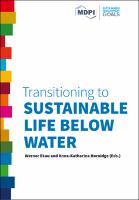Transitioning to Sustainable Life below Water
Contributor(s)
Ekau, Werner (editor)
Hornidge, Anna-Katharina (editor)
Language
EnglishAbstract
The ocean plays a central role in the life and development of human kind. Besides space for navigation and trade (roughly 10 billion tons of commodities are transported across the oceans each year), the provision of biological and non-living resources is the most important service of the marine ecosystems. Yet, these ecosystems are increasingly impeded by human activities and interventions. Human and naturally induced changes in climate are buffered by the ocean, but its capacity to compensate the increase of CO2 in the atmosphere is at its limit. The increase of global temperatures and the decrease of oxygen concentration and pH are severe stressors for aquatic species and thus for the whole ecosystem. Urbanisation and population growth at the coast, along with severe levels of pollution, are stressing coastal environments and hampering or interrupting life cycles of species as well as the well established and naturally balanced internal interconnections within and between ecosystems. Mining for oil and gas is interfering with fisheries, competing for space with other sectors and increasing the risks for large scale pollution. The result is a decline in ecosystem services and a negative feedback into the socio-economic systems. The recent reports by IPBES and IPCC underline the degrading conditions in which the ecosystems are situated today. The IPBES report evaluates a number of direct and indirect drivers. Population increase, technical development, malfunctioning of governance and spreading of conflicts affect direct drivers such as sea use change, direct exploitation, climate change, pollution, invasive species and others. read less Following a series of summits and conventions that prompted the United Nations in recent decades, Rio de Janeiro in 1992, Johannesburg in 2002 and Rio+20 in 2012, all of which were rather land-based, the Sustainable Development Goals 2015 set a new landmark in which the ocean, too, was finally acknowledged as significant to global development. The Ocean Conference in New York in June 2017 led the international community to formulate clear goals for the development of the ocean. The volume Transitioning to Sustainable Life below Water will address critical issues in ocean use and reflect against goals and targets of SDG 14 and other relevant SDGs. Transitioning to Sustainable Life below Water is part of MDPI's new Open Access book series Transitioning to Sustainability. With this series, MDPI pursues environmentally and socially relevant research which contributes to efforts toward a sustainable world. Transitioning to Sustainability aims to add to the conversation about regional and global sustainable development according to the 17 SDGs. Set to be published in 2020/2021, the book series is intended to reach beyond disciplinary, even academic boundaries.


 Download
Download Web Shop
Web Shop